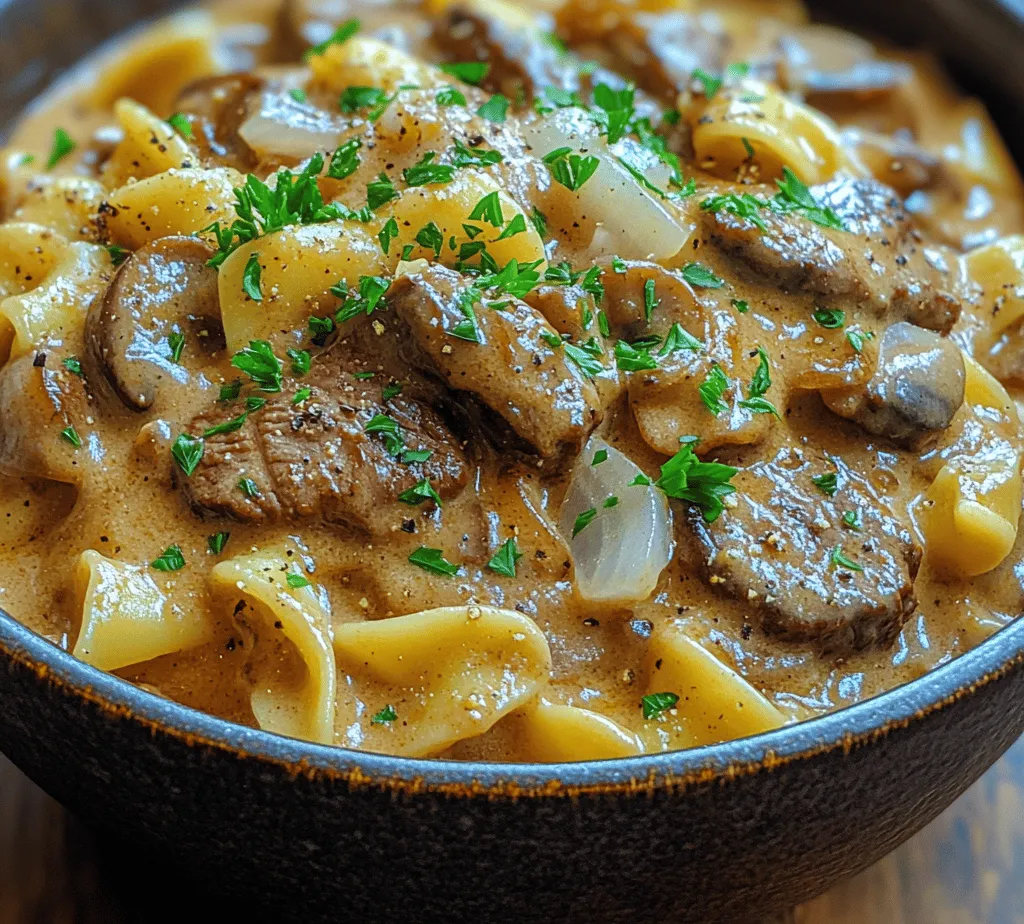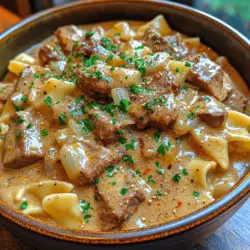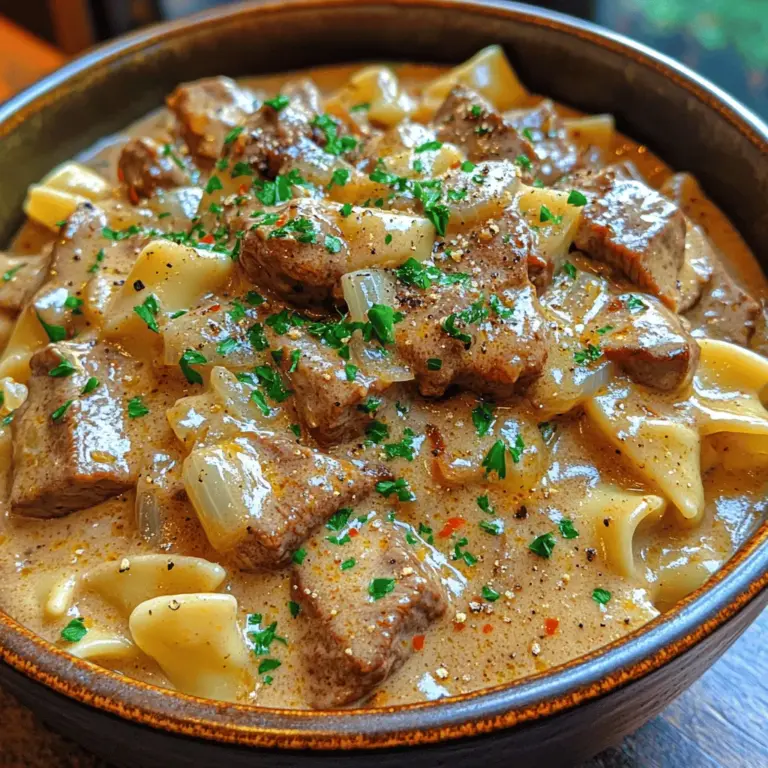Introduction
Beef stroganoff stands as one of the quintessential comfort foods, a dish that brings warmth and nostalgia to the dinner table. Its rich history and creamy texture have made it a beloved staple in households around the world. Originating from Russia, beef stroganoff has evolved over the years, finding its way into various culinary traditions. This particular recipe, Savory Beef Stroganoff Delight, captures the essence of this classic dish, promising an explosion of savory flavors enveloped in a luscious sauce.
Whether you’re planning a family dinner or looking to impress guests at a special occasion, this dish is sure to satisfy. The combination of tender beef, earthy mushrooms, and a luxurious creamy sauce served over egg noodles creates a comforting meal that is both hearty and elegant.
Understanding Beef Stroganoff
Historical Background of Beef Stroganoff
Beef stroganoff has its roots deeply embedded in 19th-century Russian cuisine. It is believed to have been named after the Stroganov family, wealthy merchants who were known for their patronage of the arts and culinary endeavors. Initially, the dish was a simple preparation of sautéed beef in a mustard and cream sauce, served with rice. Over time, the recipe evolved, incorporating various ingredients and cooking methods, leading to the stroganoff we know today.
As the dish traveled beyond Russia, it adapted to the tastes and preferences of different cultures. In the United States, for example, it became popular during the mid-20th century, often featuring canned cream of mushroom soup as a shortcut. However, the authentic version, which highlights fresh ingredients and robust flavors, remains a culinary gem that home cooks cherish.
Variations of Beef Stroganoff Across Different Cultures
The beauty of beef stroganoff lies in its versatility. Different cultures have put their unique spin on this dish, leading to a variety of interpretations. In France, for example, you may find a version that includes a splash of red wine, enhancing the sauce’s richness. In Germany, you might encounter a variation made with spaetzle, a type of egg noodle that pairs beautifully with the creamy sauce.
Additionally, vegetarian and vegan adaptations have emerged, substituting beef with mushrooms or tofu to cater to diverse dietary needs. Regardless of the variation, the core elements of tender meat, creamy sauce, and hearty noodles remain steadfast, allowing each version to pay homage to its origins while embracing modern culinary trends.
The Significance of the Dish in Modern Culinary Traditions
Today, beef stroganoff is more than just a meal; it is a celebration of comfort and nostalgia. It is a dish that evokes memories of family gatherings, cozy evenings, and shared laughter around the dinner table. As culinary enthusiasts seek to recreate traditional recipes with a modern twist, beef stroganoff remains a favorite choice, often served at both casual dinners and formal occasions.
Moreover, the dish is celebrated for its adaptability, allowing cooks to experiment with flavors and ingredients while maintaining its comforting essence. Whether you’re a seasoned chef or a novice in the kitchen, preparing beef stroganoff can be a gratifying experience, inviting creativity and personal flair into the cooking process.
Ingredients Breakdown
Creating the perfect beef stroganoff requires a careful selection of ingredients that work harmoniously to produce a dish bursting with flavor. Let’s break down the key components of this savory delight:
Beef Sirloin: Why It’s the Best Choice for Stroganoff
The star of the dish is undoubtedly the beef, and for this recipe, beef sirloin is the ideal choice. Known for its tenderness and rich flavor, sirloin provides the perfect balance between quality and affordability. When cooked correctly, it remains juicy and succulent, making it a favorite for stroganoff.
When selecting beef, look for cuts that are well-marbled, as the fat content helps to keep the meat moist during cooking. If sirloin isn’t available, cuts like tenderloin or flank steak can also work, but be mindful of cooking times to ensure the meat doesn’t become tough.
Olive Oil: Importance of Using Quality Oils in Cooking
Quality olive oil is essential in bringing out the flavors of the dish. It not only serves as the cooking medium but also adds a subtle richness to the sauce. Extra virgin olive oil, in particular, is recommended for its robust flavor and health benefits, including healthy fats and antioxidants.
Using high-quality olive oil can elevate the overall taste of the beef stroganoff, providing a fragrant base that enhances the sautéed onions and mushrooms.
Onions and Garlic: Flavor Enhancers in the Dish
Onions and garlic are indispensable in building the flavor foundation of beef stroganoff. The natural sweetness of onions caramelizes beautifully when sautéed, adding depth to the sauce. Garlic, on the other hand, offers a pungent aroma and a hint of spiciness that complements the beef perfectly.
When preparing the dish, it’s crucial to sauté the onions and garlic until they are soft and fragrant, allowing their flavors to meld into the sauce and create a delicious base for the dish.
Mushrooms: Their Role in Adding Umami and Texture
Mushrooms play a pivotal role in beef stroganoff, contributing both umami and texture. Varieties such as cremini or button mushrooms are often used, providing an earthy flavor that pairs perfectly with the rich beef. They absorb the sauce and add a delightful chewiness to each bite.
When adding mushrooms to the dish, it’s important to ensure they are cooked until they release their moisture, allowing them to caramelize and enhance the dish’s overall flavor profile.
Beef Broth: The Foundation of a Rich Sauce
Beef broth is the backbone of the stroganoff sauce, imparting a savory depth that binds all the flavors together. Using homemade or high-quality store-bought beef broth can significantly elevate the dish, as it acts as a flavorful base for the sauce.
For an added layer of richness, consider reducing the broth before adding it to the sauce, allowing the flavors to concentrate and intensify.
Worcestershire Sauce and Dijon Mustard: Their Contribution to Depth of Flavor
Worcestershire sauce and Dijon mustard are essential ingredients that add complexity to the stroganoff. Worcestershire sauce brings a tangy, savory note, while Dijon mustard adds a subtle kick and creaminess to the sauce. Together, they enhance the overall flavor profile, balancing the richness of the beef and the creaminess of the sour cream.
When incorporating these ingredients, a little goes a long way. Start with small amounts, adjusting to taste as the sauce simmers.
Sour Cream: The Secret to a Creamy Finish
Sour cream is the final touch that transforms the stroganoff into a creamy delight. It adds a tangy richness that complements the beef and mushrooms beautifully. When stirred into the sauce at the end of cooking, it creates a luscious texture that coats the noodles perfectly.
For a lighter version, Greek yogurt can be used as a substitute, providing a similar creamy texture with added protein.
Egg Noodles: The Perfect Pairing for Stroganoff
Egg noodles are the classic choice for serving with beef stroganoff. Their delicate texture and ability to hold onto the sauce make them an ideal accompaniment. When cooked al dente, they provide a satisfying bite that complements the creamy sauce and tender beef.
If you prefer a different noodle type, wide pasta or rice can also be used, but egg noodles remain the traditional and most popular pairing for this dish.
Discussion on Potential Ingredient Substitutions for Dietary Needs
While the traditional beef stroganoff is undeniably delicious, accommodating dietary needs is essential. For those seeking a gluten-free option, consider using gluten-free pasta or rice. If you want to reduce fat content, low-fat sour cream or Greek yogurt can serve as lighter alternatives without sacrificing creaminess.
For a vegetarian option, substitute the beef with mushrooms or a plant-based protein, and use vegetable broth instead of beef broth. These adjustments allow everyone to enjoy the comforting flavors of stroganoff, regardless of dietary preferences.
Preparation Steps
Now that we’ve covered the ingredients that make this dish shine, let’s dive into the preparation steps, ensuring you create a Savory Beef Stroganoff Delight that will impress your family and friends.
1. Prepare the Ingredients: Begin by gathering all your ingredients. Slice the beef sirloin into thin strips, chop the onions, mince the garlic, and slice the mushrooms. This pre-preparation makes the cooking process smoother and more enjoyable.
2. Sauté the Onions and Garlic: In a large skillet or saucepan, heat a tablespoon of olive oil over medium heat. Add the chopped onions and sauté until they become translucent, about 3-4 minutes. Stir in the minced garlic and cook for an additional minute, being careful not to let it burn.
3. Brown the Beef: Increase the heat to medium-high and add the sliced beef sirloin to the skillet. Season with salt and pepper. Sear the beef for about 3-4 minutes, stirring occasionally, until it is nicely browned on all sides. Remove the beef from the skillet and set it aside.
4. Cook the Mushrooms: In the same skillet, add another tablespoon of olive oil if needed, and add the sliced mushrooms. Sauté until they have released their moisture and are golden brown, about 5-7 minutes.
5. Deglaze the Pan: Once the mushrooms are cooked, deglaze the pan by adding a splash of beef broth, scraping the bottom to release any flavorful bits stuck to the pan. This step adds depth to the sauce.
6. Create the Sauce: Return the beef to the skillet, along with any accumulated juices. Add the remaining beef broth, Worcestershire sauce, and Dijon mustard. Stir to combine and bring the mixture to a gentle simmer.
7. Thicken the Sauce: Allow the sauce to simmer for about 10 minutes, reducing slightly. If you prefer a thicker sauce, you can mix a teaspoon of cornstarch with a tablespoon of cold water to create a slurry. Stir this into the sauce and cook until thickened.
8. Finish with Sour Cream: Reduce the heat to low and stir in the sour cream, mixing until fully incorporated. Taste and adjust seasoning with additional salt or pepper if needed.
9. Cook the Egg Noodles: While the sauce is simmering, cook the egg noodles according to package instructions. Drain and set aside.
10. Serve: Once the noodles are ready, serve the beef stroganoff over a bed of egg noodles, garnishing with fresh parsley if desired.
With these detailed steps, you’re well on your way to crafting a delightful beef stroganoff that embodies the essence of this classic comfort dish. Enjoy the process, and prepare to share the delicious results with those you love!

Cooking the Egg Noodles
Cooking the egg noodles is a crucial step in achieving the perfect texture for your beef stroganoff. It’s essential to time this step correctly, as undercooked noodles can be too chewy, while overcooked noodles may become mushy and lose their appeal. Start by bringing a generous pot of salted water to a rolling boil. The salt not only enhances the flavor of the noodles but also helps in retaining their firmness. Add the noodles and stir gently to prevent them from sticking together.
Cook according to the package instructions, usually around 6-8 minutes for egg noodles, but taste-testing is key. You want them to be al dente, meaning they should have a slight bite to them but not be hard. Once cooked, drain the noodles, but reserve a cup of the starchy cooking water. This water can be a fantastic addition to your sauce later on, helping to bind the flavors and achieve a silky consistency.
Sautéing the Beef
To achieve a perfect sear on the beef, it’s vital to work in batches if you’re using a larger quantity. This prevents steaming and allows each piece to develop a rich, golden crust. Start with a high-quality cut of beef, such as sirloin or tenderloin, and slice it into thin strips. Pat the beef dry with paper towels to eliminate moisture, which is essential for proper browning.
In a large skillet or Dutch oven, heat a tablespoon of oil over medium-high heat until it shimmers. Carefully add the beef in a single layer, ensuring not to overcrowd the pan. Allow the beef to sear undisturbed for about 2-3 minutes before flipping, which fosters the Maillard reaction, enhancing flavor and color. Once browned, transfer the beef to a plate and set it aside. This technique will ensure your beef remains tender and juicy when combined with the sauce later.
Cooking Onions and Garlic
Next up is the aromatic base of your stroganoff: the onions and garlic. Begin by adding another tablespoon of oil or butter to the skillet, scraping up any browned bits from the beef for added flavor. Add diced onions and sauté over medium heat until they become translucent, about 5 minutes. Stir frequently to prevent them from burning.
Once the onions are softened, add minced garlic, cooking for an additional 1-2 minutes. The goal is to release the fragrant oils without allowing the garlic to brown, as burnt garlic can impart a bitter taste to your dish. If you find your onions beginning to brown too quickly, reduce the heat slightly.
Preparing Mushrooms
Mushrooms are a key component of beef stroganoff, adding both umami flavor and a pleasing texture. For best results, use a mixture of cremini and button mushrooms for depth. Clean the mushrooms with a damp paper towel to remove any dirt, and slice them evenly to ensure uniform cooking.
Add the mushrooms to the skillet after the onions and garlic have been sautéed. Cook them over medium-high heat, stirring occasionally, until they release their moisture and brown slightly, about 5-7 minutes. This step is critical, as it enhances their flavor and prevents a soggy texture in the final dish.
Combining Ingredients
With the beef, onions, garlic, and mushrooms ready, it’s time to bring everything together. Lower the heat to medium and return the beef to the skillet, along with any juices that have accumulated on the plate. This will allow the flavors to meld beautifully.
Next, sprinkle in flour (about two tablespoons), stirring continuously to coat the mixture. This will thicken the sauce as it cooks. Gradually add beef broth (approximately two cups), stirring to combine and scraping the bottom of the skillet to release any flavorful bits stuck to the pan. Bring the mixture to a gentle simmer, allowing the flavors to develop for about 5 minutes.
Incorporating Sour Cream
To achieve that signature creamy texture of beef stroganoff, it’s important to incorporate sour cream properly. After the sauce has simmered and thickened, reduce the heat to low and remove the skillet from direct heat. Stir in the sour cream gradually, ensuring it blends smoothly into the sauce.
To prevent the sour cream from curdling, you can temper it by adding a small amount of the hot sauce to the sour cream first, stirring to combine before adding it back to the skillet. This technique ensures a rich and creamy sauce that envelops the beef and noodles harmoniously.
Serving Suggestions
Presenting your beef stroganoff appealingly can elevate the dining experience. Start by placing a generous portion of egg noodles on each plate, creating a nest for the beef stroganoff to rest upon. Spoon the beef and sauce over the noodles, allowing the rich gravy to cascade down the sides.
For a vibrant touch, consider garnishing with freshly chopped parsley or chives, which adds a pop of color and flavor. As for side dishes, steamed vegetables such as broccoli or green beans complement the rich flavors of the stroganoff beautifully. A light salad with a tangy vinaigrette can also provide a refreshing contrast.
When it comes to beverages, a glass of red wine, such as a Merlot or Cabernet Sauvignon, pairs nicely with the robust flavors of the beef. For non-alcoholic options, a sparkling water with a slice of lemon or a fruit-infused iced tea can be equally delightful.
Nutritional Information
Understanding the nutritional value of your dish is essential, especially if you’re mindful of your dietary intake. A standard serving of beef stroganoff typically contains around 450-500 calories. The breakdown is approximately 30 grams of protein, 20 grams of fat, and 45 grams of carbohydrates, depending on the specific ingredients used.
This dish strikes a balance between indulgence and nutrition. The beef provides a hearty source of protein, while the addition of mushrooms and onions introduces vitamins and minerals to the meal. If you’re looking to lighten the dish, consider using leaner cuts of beef or substituting some of the sour cream with Greek yogurt.
Variations and Customizations
One of the fantastic aspects of beef stroganoff is its versatility. If you’re looking to switch up the protein, chicken breast or even ground turkey can be excellent alternatives. For a vegetarian option, consider using tofu or tempeh, sautéed until golden brown to mimic the texture of beef.
Adding vegetables like spinach, bell peppers, or zucchini can enhance both the nutrition and flavor of the dish. For those following a vegan diet, you can replace sour cream with coconut cream or a cashew cream, and use vegetable broth instead of beef broth for a similar creamy texture.
Conclusion
Beef stroganoff is not just a meal; it’s a comforting dish that brings warmth and satisfaction to any dinner table. The combination of tender beef, savory mushrooms, and creamy sauce is sure to please everyone. We encourage you to try this recipe and savor the rich flavors that develop as you cook.
Gather your loved ones and enjoy the process of creating this classic dish together, celebrating the joy of home-cooked meals. With its endless variations and adaptability, beef stroganoff remains a beloved staple in home cooking, proving that comfort food can be both delicious and versatile. Whether you stick to the traditional recipe or make it your own, the delightful experience of savoring beef stroganoff is one that will endure for generations.


